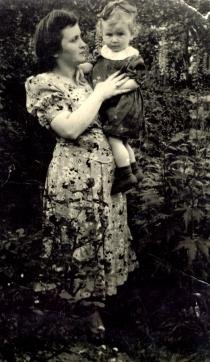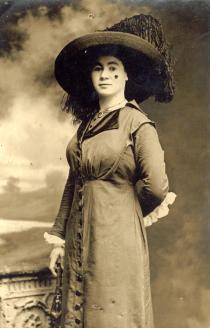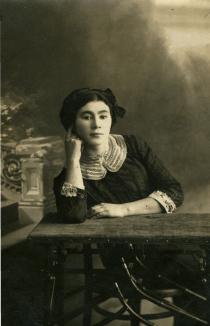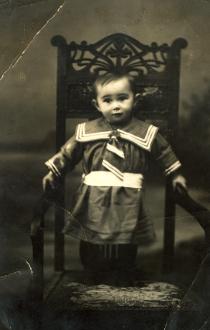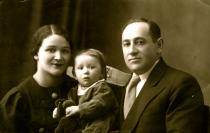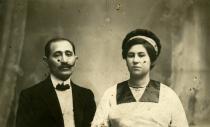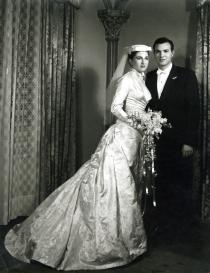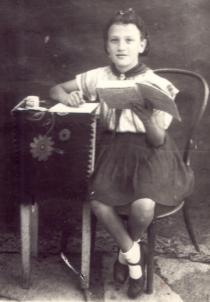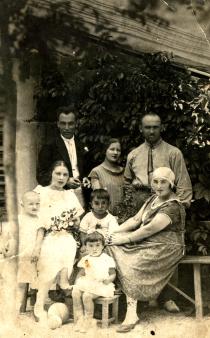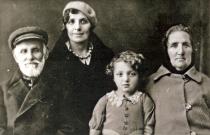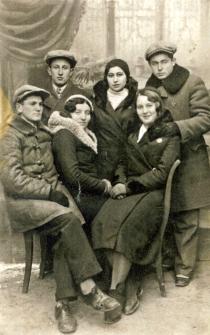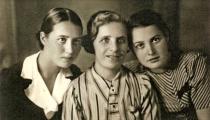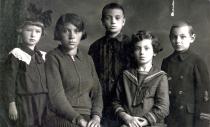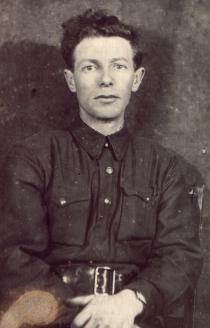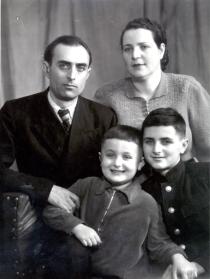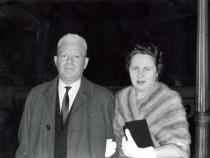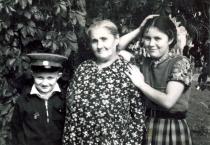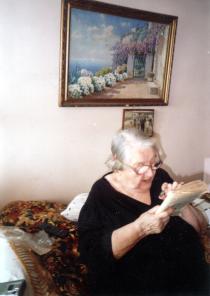
Sarah Rutkauskene
Vilnius
Lithuania
Interviewer: Zhanna Litinskaya
Date of interview: October 2005
I was told about Sarah Rutkauskene in the Jewish community of Kaunas. I asked her for an interview and she instantly agreed to it. I came in her apartment. She is living with her daughter Lina. Her apartment is in the building constructed in the 1970s. Sarah is a rather elderly lady of sound mind. She gladly communicated with me. At times during our conversation I understood that her memory would fail her, so I assisted her with my questions which helped rebuild the verity of the story. Sarah accepted me in her room, where moved after war. She was sitting on an old couch. Her bed was not made, as she kept to bed almost all the time. Today is Sarah’s birthday and sometimes we had to stop when the children and grandchildren came with presents and dainties to congratulate Sarah. The apartment looked ramshackle, showing that was occupied by elderly ladies who had no neither efforts nor means to keep it clean and organized. I also congratulated Sarah on her birthday and wished her health, well being, quiet life and 100th jubilee.
My family background
Growing up
During the war
After the war
GLOSSARY:
My maiden name is Klug. I was given a double name Sarah Polya. I was named after paternal grandmother who died at parturition a long time ago, when she was 22. Mother’s relatives were against naming me after her as they said that I would be doomed for a short life. (editor’s note: according to the Jewish tradition, the newly born baby was supposed to be named after deceased, nevertheless it was a bad omen to name a baby after the person who died young.) My father was persistent. I had a long life. I am 89.
My paternal grandfather Benjamin Klug, born in 1859, lived in some hamlet, where he tilled the land. He had a lot of land, where he and field hands were working. Benjamin was married thrice. I do no know anything about the first wife. He had two grown-up daughters from the first marriage. I saw them couple of times when I was little. My grandmother Sarah Polya was his second wife. She died when giving a birth to the third baby- my dad. When the guys grew up, they needed to get a good education. Benjamin sold his land, house and a husbandry and bought a house in a small town Jelva, not far from Ukmerge [about 70 km from Vilnius]. My father spent his adolescence. I was born and raised there as well.
Our town was situation in a picturesque place on the river scroll. On one of the hills , at the place, where the river turned, there was a town and on another one there was a village, which was mostly Jewish families lived here. As a rule they were tradesmen and craftsmen. There were the stores in the downtown. Some of them sold manufacture goods, other groceries and pharmaceutical products. There were workshops here- tailors’, cobblers’, hatters’, glazers’ and joiners’. It appeared that the representatives of all crafts lived in Jelva. They Jews and Lithuanians not merely got along, but they were friends and trusted each other. Often, Lithuanians and Poles could not pay for the products purchased in the store. Then the surname and the amount of debt were entered in the book and in the autumn after harvesting the debtors were supposed to come to store and pay back the debt. Nobody was dishonest or fraudulent with the owners of the store.
My grandfather Benjamin Klug was a merchant. He was a grain trader. He did not have his own warehouse. Usually he went from village to village and made agreement to buy the grain from them in the fall. The grain purchased from the peasants, was taken by Benjamin to Ukrmerge in a cart. He sold it to grain traders there and had pretty good interest. I remember his wife vaguely. She had lived with us for several years and died at an elderly age.
After his wife’s death grandpa lived with one of his daughters from the first marriage, but he often called on us. He loved me very much as I was the elder granddaughter of his son. I even remember how he took me for a walk in the forest, where we made a hut. Then he put the berries on a white sheet of paper and pretended to be a chicken, which was nibbling on them and I burst into laughter. Grandpa Benjamin was loved by everybody. He was of short height, athletic, always neat and tidy. He always wore kippah and tallith when he went to the synagogue on Saturday. In summer 1922 grandpa took a usual trip to the village to agree on the grain. He felt unwell and asked a peasant for a glass of water. He had been dead by the time the peasant brought the water. He died from heart stroke instantly at the age of 63. Benjamin was taken to Jelva, where he was known and loved by people. His body was taken to his daughter’s house. When my mother took me in her hands to take me there so that I could say good-bye to grandpa, Jewish ladies were trying to stop her. They said, in accordance with Jewish traditions, babies, whose parents were still alive, were not supposed to see cadavers or even worse say good-bye to them. my mother replied that grandpa loved me very much and deserved that I should say good-bye to him. I remember we entered the room, which was full of people in black clothes. We came close to grandfather, who was lying on the floor. Mother wiped his forehead and told me to kiss it. I was scared as it was unusual for me to see his immovable body.
Grandpa Benjamin had 5 children – two daughters from the first marriage and three sons from Sarah Polya. The elder daughter Malka, born in 1880s, in whose house grandfather had lived until he died, moved to Panevezys shortly after his death. Her husband was a furrier, a rather rich man, so Malka lived comfortably not only from material standpoint. I do not remember her husband’s name, it began with Vov. When he died, Malka and her children managed to flee from fascists. When great patriotic war was over, they came back in Lithuania, wherefrom they shortly left for Israel. Malka died in 1970е and Rosa is currently living in Israel. I cannot recall the name of grandfather’s second daughter. I remember that she lived in Ukrmerge with her husband and children. She died there with her family during the occupation 1 of great patriotic war.
Father’s elder brother Itschok was born in 1892. he was a cobbler. In late 1920s he, his wife Chiena and daughter Khava left for South Africa. There Chiena gave birth to two more children- a girl Leya and a boy. She died young, without even reaching 40. Itschok died in 1950s. Khava, who had been very beautiful since childhood, had the title of South Africa beauty queen and married a millionaire. She helped her parents and her siblings lived in her place. Now Khava is still alive. She has a large family – many children and grandchildren. Leya is currently living in Israel.
Father’s second brother Elieser ,who was two years younger than Itschok, also left for South Africa. Before his departure he married a Jew from Jelva. I do not remember her name. His sons were born in Africa. Both of them were very gifted, graduated from Cambridge. They are married and currently living in London. The elder one became a famous atom physicist. Two years ago he was in Lithuania and called on us. Elieser had a long life and died in 1980s.
My father Ieguda Klug was born in 1896. He was raised without mother, but grandfather Benjamin made home full of warmth and trust. I do not know what part his raising was taken by his third wife, but my father was brought up very well, treated people wonderfully. He was a very kind person. Father went to the elementary school, then started assisting grandfather with grain trading. He married at a young age. He was almost twenty. He was four years younger then mother, but when he saw her he fell in love with her once and for all and started courtship.
My mother’s maiden name is Yashinskaya. Her father, my maternal grandfather Iechiel Yashinksiy was born in 1850s in some Lithuanian town. I do not remember its name. I do not know who his parents were. All I know is that the family was very religious. Grandfather went to cheder, eshiva, and then entered rabbi school. I do not know whether the latter school was. I assume it was in Panevezys. During the studies Iechiel Aria understood that rabbi were usually very poor, depending on the community and parish, who pay for their maintenance. He saw them wearing one and the same clothes all the time, their wives barely scraping through, their children wearing hand me downs. Right before finishing school, before taking final exams, Iechiel refuse to become a rabbi. He decided to be a craftsman. He became an apprentice of one very good tailor and agreed with him that he would pay for accommodation, meals and training after starting making money. My grandfather’s teacher turned out to be a very decent man and when grandfather became a tailor he took no money from him. Besides, he gave good clothes to grandpa and money to start business. In a year or two grandpa had his own tailors’ workshop, where about 8 people were working. Dad said that he paid the ladies with gold as there going to save it for their children’s training or weddings, and men were paid money.
Soon Iechiel Aria married my grandmother Leya. She was born in Dublin, the capital of Ireland and spent her childhood there. When she turned 15 or 16 , her family moved in Lithuania. I do not exactly where they grandpa and his young wife got settled. It was a small town, located not far from Ukrmerge. Here they had lived for many years. Grandfather had tailors’ business, and grandmother raised children according to Jewish traditions. There were ten of them and every year or a year and a half a new baby was born. In 1920s grandparents moved to Ukrmerge, where they lived to see the Soviets come to power 2, and then the beginning of Great Patriotic War and occupation. They died here during one of the first actions in summer 1941.
I had not known all mother’s siblings. One of those whom I knew was the eldest sister Chaya. She was born in 1885. At the age of 14 she was sent to some relatives in Canada, where she grew up, got married and bore children. This is all I know about her. Mother’s second sister Berta, who was two or three years younger than my mother, was very beautiful. She married a musician, a Jew with Polish name Kovalski. It was a love wedlock. They left for Canada to Chaya. Berta had two daughters. One of them Sarah recently wrote letters to us. I cannot recall when Berta died. She had a long and happy life.
Mother’s youngest sister Mere Sheine was born in 1900. She was a true beauty- the most beautiful the family. Neighbors and relatives called her beauty ». She fell in love with one Jewish lad Leib. His mother left for USA in 1914 due to the just unleashed World War One and could not come back. Many people were sorry for him and in accordance with Jewish traditions invited them in and fed. Thus he came home to my grandmother and Mere Sheine fell in love with him at first sight. Leib was a very tall and strong guy, a true Jewish handsome guy. They had a beautiful Jewish wedding. The whole town was there. After wedding, Mere Sheina moved to his small house beyond the river in Ukrmerge. By the beginning of great patriotic war they had two or three children. Leib and Mere Sheina did not manage to escape from fascists and remained in occupation. They had a pretty quiet living for couple of months when Germans came as they were not in the downtown, but beyond the river, where Lithuanians lived mostly. Once, Leib went in the city to buy products. He stood in the line and then asked to give him some products before his turn came. One Lithuanian went outside and called the fascists saying that a Jew «was jumping the queue». Germans took Leib in the yard and started beating him. He was not willing to give up, he took an axe from the butcher and rushed to fascists. Leib was shot dead right away. Mere Sheine and her children were killed during one of the actions in a while after Leib’s death.
Out of all mother’s brothers I knew Itschok the best. He lived in the province. He was a tailor. Our family said that he was a good one. He could make garments (including outer ) for ladies, gentlemen and for children just the way grandpa was. In the middle 1900s he left with his family for Canada. Itschok’s son Naum was a professor. He was about ten years older than me so I assumed that Itschok was born in 1880. In 2003 Naum was in Lithuania, called on me and said that father reached 90 being mentally and physically sound. He had been a tailor all his life. Another mother’s brother Kivi, who also lived with his family in a province, was killed by fascists in 1941. I saw him only once during his visit in Ukrmerge. This is all I know about him. Mother had brother Meyer, whom I do not remember very well. He lived somewhere else and once he came to us with his daughter Sima. Meyer’s family, including Sima also perished during the occupation.
My mother Riva Yashinskaya was born in 1891. She got a home Jewish education. She knew how to read and write in Yiddish and knew the prayers in Ivrit. Mother was very beautiful, but in 1914 she had chicken pox, which left the scars on her face. At that time she was living in Vilnius. Grandfather taught her the basics of sewing and she worked as a seamstress. My parents met in Vilnius. Father and his brother Elieser came here on some holiday. In spite of mother being four years older than him and with the pox marks, which she took hard, father fell in love with her. My parents got married in early 1916. I never asked them where they were wed, but I know that it was in accordance with Jewish rites.
After wedding, parents settled in the house, where father’s elder sister and her family, grandfather Benjamin, father’s brother Elieser were living. Parents occupied a small room. Here I was born on 10 October 1916. Life was pretty hard during the first years of my life. It was hard for my mother to live here with another family. Then there was a story which radically changed the life of our family.
Grandfather’s house was in front of Lithuanian cathedral, in about 10 steps to it. There was a padre’s home in about ten meters from the cathedral. His wife and children lived there. Unfortunately, I do not remember the padre’s name. I remember that he had a brother Petras. In 1917 or 1918, Polish army was dislocated in our town during World War One. They made plundered both Lithuanians and Jews. Once grandfather hear the cries: «Benuleki (that was the way grandfather, father and his brothers were called), help!». Father and grandfather, took what was at hand- spade, club, darted to padre’s house. There was priest’s wife on the threshold crying out as a Pole was going to cut her fingers, since she could not take her rings off in panic. My grandfather hit the guy, who was holding the lady, with a club and the second was trying to run away. Grandfather ran to the Jewish cemetery right away to hide there among the tombstones and father ran somewhere. He took a horse and rid to the village. Some strangers – both Jewish and Lithuanians- ransomed Benjamin. They had been trying to save his life all night long – exchanging cold and warm sheets. He had been between life and death for a week and finally he started getting better. When the Poles retreated, there was a calm period. During the service the padre at the pulpit told his parish that my father and grandfather saved him and he owned his life to him. Knowing that we did not have a large land plot, he cut a big land plot from the church and gave it to father. He also asked the Lithuanians to build the house for us- people started brining timber, oaken boards. Lithuanians built a nice large wooden house for several months. Father did the finishing. When the house was finished, the padre noticed that there was no room for the husbandry and gave another land plot for that, probably it was half a hectare up to road, where the was a room for the well and garden. There was a shed and a land plot with the clover for the cattle. There were nice sheds for fire wood, coops, sheds, stables. Our house was very large , consisting of four rooms and a huge kitchen. There were some more premises in the upper storey, which father leased. The cell was the house length. Since that time father and padre had become friends.
We became well-off in a large house. In early 1919 my brother Leibl was born. Then in 1920 a girl was born. She was given a Hebrew name Janina ( means dove in Ivrit). Only in five years mother gave birth to a very handsome boy, who was blue-eyed and fair-haired. He was named Benjamin after grandfather, who died several years ago. Then in 1927 Beinish was born and the youngest beautiful baby Miriam was born in 1931. Relatives, especially grandpa, loved me best of all as I was their first granddaughter. Mother said that my relatives hugged me and tossed me up saying: «wise head,beauty!»
My parents worked hard and therefore our family was very well-off. Apart from our house, father owned farm land in the village. He hired Lithuanians to work for him and paid them upon harvesting. They had very good relationship. Father paid them well. When the peasants were in Jelva, thee called on us where they could always be accommodated and fed. Father planted wheat, rye, potatoes, carrots, cabbage, beat and the whole land plot for planted. Father planted clover and other feed grains for the cattle. There were several cows in the shed. Their milk was nice and fatty. It was enough for the family and for processed products. Mother made butter, sour cream, cheese and curds. Part of dairy products was sold to regular customers. Mother also bred the poultry. There were a lot of hens, turkeys and geese. Once mother asked me to count them. When I reached 40, I was lost. Father also had horses, which he took care of with the special care. A Lithuanian man helped father with the husbandry. Living with the Jews, he learned Hebrew so well, that he even helped us, children do homework, when we were going to school. Mother had a Lithuanian cook, who learned how to cook good Jewish dishes under mother’s supervision. The kitchen was very large. There was a large stove in the center of the room. It was used for cooking and baking. Mother baked bread as she could not recognize purchased bread.
The four well-furnished rooms, taken by our family, were in the bottom part of the house. It was a good carved furniture made by good mahogany joiners. There were a large round table, chairs, couch, and cupboard in the drawing room. There two large wooden beds in parents’ bedroom. There was a small baby crib by mother’s bed, where the babies were sleeping. There were two more bedrooms- one for the boys and another for my sister Janina and I.
My parents were very religious and since childhood plied us with the religious beliefs and dogmas. Every day started with morning hygiene, prayer during which the people were turned to the east. Those who had not prayed, were not given breakfast. I remember one case during the prayer. I was a little girl and did not always get the sense of the prayers. I just memorized them by repeating after parents. There are such words in the daily prayer: «God, thank you for not creating me a woman ». Those words are pronounced by me. Once during the morning prayer I repeated those words after father. He pushed me as we were not supposed to interrupt the prayer and said that those words were to be said by him, grandpa and m younger brother. I listened to him closely and the next day repeated those words again either because of being remiss or stubborn. Father reiterated his edification. The next day I said those words again. Father just ignored me and did not say anything. Then I heard him speak to mother to bring me to reason. Mother said that I was too small and could pray the way I wished. All Jewish traditions were strictly observed in our house. Mother usually covered her head with the kerchief, when she went to the synagogue she put a beautiful cover. I am used to kashrut since childhood. There were a lot of dishes in the kitchen - 12 sets of silverware, sets of dishes and utensils for meat and milk, which were kept separately in two chests.
I loved Sabbath very much in Sabbath and was looking forward to it. On Thursday mother baked Challahs, buns and some other tasty things – cakes. At times she made a creamy cake, lekach- honey cake or meat pie. Friday morning mother stoked the stove. If it was necessary, mother bought meat in kosher store and fish. The rest we had. Mother send someone from our family to shochet, who cut one or two chickens for the festive diner. She also made gefilte fish, forshmak from herring, liver pate, chicken or meat broth, all kinds or tsimes, imberlakh. In general, we had a very rich table. We enjoyed soups. Even on Saturday mother made some soups either meat soup or chicken broth, macaroni soup or vegetable soup with beans. She made cholnt for Sabbath- it was made from potatoes and beans in a pot. There were two Jews in our street who took the cholnt for some small amount of money. They put it in the stove beforehand and gave it back on Saturday while it still was warm. On Thursday the whole family went to the bathhouse. On Friday we took bath at home and put clean clothes on. On Friday father and his sons went to the synagogue. Mother , sister and I stayed at home. When they came back from the synagogue, we sat at the table. Mother lit candles and father said a prayer. He also broke the challach and gave the first pieces to us. After dinner all of us did what they felt like. Some of us read, others went out for a walk or went to bed. The synagogue in Jelva was large, two-storied, wooden and bricked. Mother, I and later Janina prayed there on the second floor. On Saturday father picked up cholnt on the way from the synagogue. On that day we could not do anything. Lithuanians worked in the yard and the cook served the food. Rarely, when she was not at home on Saturday (her day off was on Saturday) we ate cold food. On Sabbath we could not even light a match, nothing to speak of stoking the stove. After meal, everybody took a rest. I liked reading books. Sometimes the whole family went for a walk. Usually people strolled along the bank of river Jelva ,where the Lithuanian village started. There were a lot of trees, including the fruit ones. In spring they blossomed making the air fragrant. It seemed to me like Eden. People came here with the whole families, all dressed up like it was supposed to on Saturday.
Jewish charity was very developed. Each rich and middle-class family implicitly fostered a poor family. In our house there was such a rule. On Friday, mother took two clean kerchiefs and put food there- ten eggs, curds, cheese, butter, challah, half of the hen. Being the eldest I was told to take it to poor families. As a rule I took it to poor elderly Jews Chaya and Chava, who were living nearby. If a poor girl or an orphan guy were to get married, the members of the Jewish community took care of the wedding arrangements – they collected money for that and even helped the families after wedding. It happened also in cases if someone got sick or died, God forbid – it was also on the account of the community.
My father was a very respectable man. His was kind not only to all Jews, but also to Lithuanians, Poles. Nationality did not matter for him. I remember such a case. Once there was a funeral procession passing by our house. There were people from Lithuanian hamlet, located about 12 km away from Jelva. A young was to be buried. They said he had cold beer after bath, got pneumonia and died. His wife and several children left after him. The procession went to the cathedral, where Lithuanian cemetery was located. In 20 minutes I was that the procession was going back with the cadaver. I ran after the father and he came up to those people. It turned out that a poor widow did not have time to pay for church service and funeral of her husband and the padre did not even let them inside. Father asked them to wait. Then he took a platter and put 5 litas there ( it was pretty big money for that time). Then he called on the neighbor, who also put some money there. In an hour or two father collected a considerable amount -200 litas and gave it to the widow. The procession headed to the cathedral. After that the widow knelt down in front of our house and said the words of gratitude. She tried to return the rest of the money (about 50 litas), but father said that she would need it for her children.
What happened was very strange and unpleasant to me as our family was friends with the padre and I could not get how he could act like that. Padre often invited my parents for Christmas dinner. I also was in his house. Padre was very intellectual, he knew Ivrit and read Hebrew texts. When he could not understand something, he always sent someone for me. I was well up in Hebrew since 10. I was lazy to go past our large land plot and padre’s people made hidden path. Everybody liked me in padre’s place- the servants and even big black watch dogs were affable to me. Parents did not invite padre on large Jewish holidays. When mother made gefilte fish, father always invited him as he adore that dish and even smacked while eating it. When I was 11-12, I started liking music. There was neither theater nor concert hall in our town and the only place where I could hear music was a cathedral. I often came in during the service. At times I would stand by the cathedral listening to the organ. In a while the neighbors told my father about it. I had had independent character since childhood and said that I did not listen to the service, but to the music and I was not going to reject that pleasure just because old Jews did not approve of it. Father kept silent and I think he agreed with me.
The most remarkable holiday was Pesach. We got ready for it in advance- cleaned our big house thoroughly. Children got the presents – clothes and footwear. Usually the money for it was sent by the relatives from Canada or Argentina. Several days before the holiday a delivery boy brought a large hamper with matzah from the synagogue, usually he was from a poor family. Pascal kosher dishes were taken from the garret- there was everything- both set of table dishes- starting from porcelain and up to silverware and kitchen utensils which were used only once a year. Everybody had his own shot glass. I got my tot with flower painting from uncle Elieser’s wife, when I helped her get ready for the holiday. On the eve of the holiday father carried out the rite of chametz banishment – he picked up the remaining of leaven bread and solemnly burned them in the yard. On the first day of the holiday, on the sedder all relatives came to us from synagogue as my mother the eldest daughter in law. Father was reclining on the top of the table and carried out seder. Apart from the traditional dishes (gefilte fish, chicken broth with kneydles, tsimes) there were the tastiest dishes mother could cook. There were also a lot of deserts. The wine which we had on this holiday was made by father from honey and raisons. During the sedder all traditions were observed- searches for afikoman, four traditional questions asked by younger children, awaiting Ilia, the prophet. As a rule we marked the second seder in the place of the relatives.
The rest of the holiday did not appear to be special. There was a veranda for sukkot holiday. There was a removable roof, which was removed and covered with tree branches and leaves during holidays. The door to the house was open, the table and chair were set and we had meals there during the holiday. Children were most agog for Channukah as on that holiday they received money from all the relatives. I remember, when uncle came up to us, he gave me 2 litas as I was the eldest, the rest got 1 lita. On that holiday candlestick was lit and everyday a candle was added. It was placed on the window sill. We ate potato fritters and sang channukah song, which I still remember.
On Purim mother baked a lot of pastries- mostly triangular hamantashen. There were enough for the family and for the presents which were taken to the relatives and neighbors. We also got the presents. We had fun all day long comparing deserts and cookies, comparing which were better and always mother’s were the best. She was a unique lady- kind and strict at a time. Other ladies always came to mom to ask for a recipe or for a piece of advice. Mother always found a free time and kind word for everybody.
I started studies early. When I was five, mother told father to hire a coach for me. Father hired a private teacher for me. She taught me the rudiments of Jewish literary – alphabet and reading. I had been taught at home for two years and then father took me in cheder. I know that only boys went there. I still cannot get how father could convince the teacher for me to study there. The fact was that I was the only girl in the class of ten boys. Our teacher was disabled and he wore special shoes because of his valgoid legs, but he was a great expert in Jewish studies. I sat at a desk separately from the boys. I did very well and was quick to learn. I had studied there for three years and by the age of three was very fluent in Ivrit. When I went to the synagogue, everybody was surprised to see the girl reading prayers in Hebrew. My father took special pride in me. He often bought newspapers in Ivrit , took them home and enjoyed my reading them.
When I turned 10, father took me to Ukrmerge, where I entered Jewish lyceum. Subjects were taught in Yiddish, and I had to learn a lot of knew things. At first I lived with my grandparents Jasinskiys’, who had moved to Ukrmerge a long time ago. In about two years my parents sold their house and moved to Ukrmerge. It was the time for my younger siblings to study so they decided to be closer to children. Grandparents were elderly and got irritated with children’s noise and rattle, so in about two years they moved out.
I loved studying. It was easy for me. I had a lot of friends among my classmates. We marked Jewish holidays in lyceum, staged performances, where I took an active part. I sang well, often took part in amateur concerts.
As compared to Jelva Ukrmerge was a bigger town with the population of 12 thousand people, most of whom where Jews. There was a Jewish theatre, different organizations, in general the life became very interesting. The youth took part in different youth Zionist 3 organizations. Beitar was the most active 4. The organization was rather bellicose and I did not take part in that movement. I entered Hashomer Hatzair 5 – «young guard», which called for buyout of Jewish lands and revive Jewish state in a peaceful way. My younger brother Leibl and sister Yanina also entered lyceum. Though, my parents paid minimum fee for us – 30 litas per month, it was rather large amount for our family. I had studied there for five years and decided that I was adult and it was the time for me to help my parents.
In 1936 when I finished the fifth grade, I was employed and did not come back to the studies. My parents did not mind it. First, they needed some material support, and also I was very literate for that time as compared with other girls as they studied for 2-3 years. I was employed as a sales assistant in the grocery store. The owner of the store was a Jew, whose name I do not remember. He treated me very well as I was honest and skilled. At that time I kept attending the classes at Hashomer Hatzair and was getting more and more carried away with the ideas of revival of the Jewish state. I had new friends with whom I spent time. We went to the Jewish theater, walked in the park, discussed our future. Three years had past and I found out that there was a Jewish kibbutz in Kaunas, where the youth was getting ready for repatriation. I wanted to try a new life and I found life in kibbutz romantic. In summer 1936 I asked for permission from parents, who could not say no to me, and left for Kaunas.
Kibbutz people lived in one house in Kaunas suburb. I was welcomed in their team. I housed in the room with another girl and shortly after that they found a job for me. I was for the Jewish dentist as a governess for his child. The family was very rich. The daughter went to the Jewish lyceum and I was supposed to take her to to/from lyceum, do homework with her, go for a walk, to the library. I did not do anything as those things were taken care of the servant. I was paid very well for those times- 150 litas per month. I practically did not spend the money as I had meals in the house of the doctor. In accordance with kibbutz laws the earned money was to be given to the leader. He allocated the money in line with the needs of all people from kibbutz and the decision of the general meeting. Part of the money was spent on food. There were two people in kibbutz who cooked the food for everybody. All purchases were to be approved by the board of kibbutz. Besides, when the money was distributed, the salary of the member was not taken into account, just his needs. For two years they bought me the boots only once because I could not get to work without them. I was concerned with that. I wanted to have a private life, to be fashionably dressed, buy presents for my parents and siblings. I could not spend all my life there. Besides, I did not have money to help out my parents. I even was supposed to get the permission and ask for money for the rare trips home. Within this time many people from kibbutz left for Palestine, but I did not have enough money for that.
When I came home, the situation at home was full of love, kindness. It seemed to me that I was a little girl, whom the father was proud of. I was not willing to go anywhere. Parents did not have such a big husbandry in Ukrmerge as it was in Jelva, so father became a grain trader. By that time Janina quitted her studies at lyceum and became apprentice of the seamstress in Ukrmerge who lived in front of our house. She started earning money and gave it to the parents. Janina became rather independent. She even went on vacation to Palanga and came to me in Kaunas. Leibl went to rabbi school in Panevezhis. As his grandfather Iechiel Aria he was disappointed in the spiritual care as he saw the poverty of rabbi. He even had to wear a coat in summer as his pants were torn. Once he came home and said that he would not come back in eshiva. Leibl started helping father with work. Younger brothers and sister Miriam were still studying in the lyceum.
Upon return to Kaunas, I found another job and left kibbutz. I was the governess. I worked for a wealthy Jew Finkelstein. He owned a lot of canneries in Latvia and Estonia. He produced sprats and other canned fish. He also owned the plants in the USA. Usually on new year his whole family went on vacation to the USA for two weeks and I was given a vacation. I was the governess of his daughter Sonya and did my job very well. I had my own room in the large house of Finkelstein. I had meals there. They bought me clothes. Now my salary was 200 litas. In while I changed my job not for being unfairly treated for being offered a higher salary. Within those three years I had to change my job once again. I always worked for Jewish families. In 1939 I was invited to work for the famous timber trader. The family was also very rich.
I started thinking about my future. I was at the age when I had to think of my private life. I had friends, but I spent more time with my lad than with others- we wnet to the cinema, for strolls on the weekend. But still, I was not in love with him. I was more attracted by more solid and mature men. In summer 1940 soviet army came in Lithuania 6, and all Baltic countries were annexed to the USSR 7. My hosts worried a lot, waited for the changes and in the first days the authorities did not carry out repression. I remember my host giving me money and telling that I should buy warm footwear and clothes as they would be exiled in Siberia and I would go with them. I had a different fate.
In summer 1940, the host as usual rented dacha for the whole family and went there with them. We were living in the village not far from Kaunas. There was a wonderful nature here- woods and lakes. I often went to the lake and once I noticed one young man looking closely at me. The next day he invited me for a date. I understood at once that he was the man of my dream. He was my ideal- much older and more mature than me. Though, he a Lithuanian, but it did not stop me. Soon we became close. Benis (full name Benedictus) Rutkauskas was born in 1904 in a small Lithuanian hamlet not far from Vilkovishkis. He was a peasant. He was involved in politics at a young age and became the member of the underground communist party. At Smetona’s regime 8 in1929 he was sentenced to 15 years in prison, 11 out of which he underwent. He was librated by the soviet regime. Upon his release, he was sent in hamlet for recuperation. Thus,.we met there. Within the first two week Benis did not know that I was a Jew as I looked like a Lithuanian and was fluent in that language. I had to show the document for him to believe me. When he looked at it, he said that he did not care.
We started seeing each other openly when I came in Kaunas. Benis proposed to me. His parents were dead and he had no siblings, so he needed permission from my parents only. Only Janina knew about our relationship. I took my sister and friend that she kept the secret having said nothing to the parents. In November 1940 Benjamin and I went to Ukrmerge. Benis asked for my hand. My mother stealthily whispered to me that she liked my fiancé very much as she thought that it would be better to marry such a handsome Lithuanian than a poor Jew. Mother did not share her opinion with father, who was dreaded by the fact and it was the first time I could see him in such an angor. There was a scandal and Benis was turned out. Of course, I left with him. We went to Kaunas. I was always independent and I was not going to make concessions now as I did not want to lose the person I loved. Soon Janina came to us as father turned her out having known that she was aware of our relationship and did not reveal it. Then Leibl came trying to talk me into submitting parents’ will and part Of course, Leibl was not going to kill anybody and told me about it. I did not have any secrets from Benis and told him about father’s plans. It was my most dreadful mistake as Benis had never forgiven Leibl.
On 12 December 1940 Benis and I registered our marriage in the state marriage registration authorities. We had no wedding, no rings. We were happy to start a new life. Benis held as high position – he was in charge of the communications department of Kaunas oblast, he was a respectable man and the member of the communist party, but he did not want to enjoy any benefits. We rented a room, where Benis, Janina and I lived. Janina started working as a seamstress. I did not work. Shortly after wedding I got pregnant and I had very strong toxicosis and I felt unwell.
In spring 1941 husband suggested that we should visit my parents. It was his initiative to improve my relationship with the parents. We came in Urkmerge. Parents were amiable and I understood that the reason for it was not the willingness to accept him, but the fear for him as he was on a high post and could easily affect their fate. There were a lot of repressions and many people were arrested and deported to Siberia 9. Many Jews were exiled from Kaunas, including Finkelstein and my other bosses. After war I found out that Finkelstein died in Siberia and the sank into the oblivion. Little Sonya, whom I loved so much, died in the train on the way to Russia.
We stayed in Ukrmerge for two days and went home. In couple of weeks I was told that father had been arrested. It happened in such a way. Leibl’s friend lived in our house. He was a guy from Kaunas, who rented a room from us. He was a communist, an ardent stickler of the regime. Once father argued and said that the state, which did not recognize God and the right of people for belief, was to perish. That guy informed against father right away. He was arrested and exiled in Siberia in a while. I even did not ask Benis to interfere and ask for father as I understood that he would refuse me. fortunately, the house was not sequestrated and mother had a place to live. She took her parents there as well. We did not go to Ukrmerge any more as I understood that my husband would not like to compromise himself with that trip.
Husband found out about the unleashed war right away. There was no time to wait for organized evacuation, as it was clear that fascists would enter Kaunas soon. Benis quickly organized our departure. I was in the driver’s cabin as I was 6 months pregnant. Benis and Janina got in the truck body, where the luggage was placed. On the way we picked up the family members of our driver. We were one of the first to leave on 22 June 1941. There were no bombings on our way and we rather swiftly crossed the Lithuanian border on Byelorussia. Here we made a short stop. The military took our truck in Byelorussia. Here we parted with the driver and his family. My husband talked to the commander of the military unit and indicated that I was expecting a baby. Thus, we got on the truck with the militaries and traveled for a while with them. We spent a week in a military camp, which was in the rear. We asked to send us farther in the rear, and the arrangements were made for us to take a train. We were helped to get on the locomotive train, packed with the fugitive, heading for Tartar republic. I vaguely remember the way. My husband told me to take a side berth. I was asleep almost most of the time.
We got off at Kuchmar station, which was not far from Kazan [Tatarstan, about 800 km to the East from Moscow]. We settled in a small room in the house of the locals, who treated us very kindly. Sister took care of house, and husband went to work. Here we lived two month and a half until I bore a baby. My girl came into the world in late August 1941. Husband wanted to call her Lena 10 after Lenin, but her name was accidentally written Lina. We decided that it was also a nice name as Lina means flax in Lithuanian, we still call her that name. when the daughter was born, we moved to the village Mamafe, not far from Kukhmar. It was easier to survive in a village at that time.
The four of us lived together until the New Year of 1942. Janina and my husband worked in kolkhoz 11, and got skimpy trudodni 12. Our life was hard like it was with most fugitives. Husband and sister also got bread cards 13 for working people and I was given 200 gramps as I was dependent. Janina and Benis gave all they could to me as I was a nursing mother. Benis was eager to go in the lines. He volunteered to join 16 Lithuanian division 14 as soon as it was founded. He was a rank and file in the artillery. In January 1942 he went in Balakhna, where the above-mentioned division was being formed. In about 3 months Janina also joined Lithuanian division.
I stayed with Lina. We were living at home, where five families of evacuated lived. There were no Jews among them, I was the only Jew there. Mother and daughter from Latvia, two Lithuanian old ladies, young Lithuanian with a baby and Russian family were living in one house. We were very friendly, helping each other. It would be unlikely to survive in those years without each other’s help. Our house at the end of kolkhoz orchard and I was hired to watch it along with the adjacent gardens. It was not a hard work. Besides, I was given fruit, vegetables and honey from the apiary. The deputy chairman of kolkhoz often called me over to wash the floors in his office or do some other odd jobs. Every time I was given a loaf of bread for that. When the horse was cut in kolkhoz he asked me to come over and gave me a piece of meat. In the morning we, the ladies fugitives, took the jugs and came to the shed where the milkmaids brought the milks to be given to the state. Each local lady from kolkhoz gave us a little bit of milk. at times we would get only a glass, but there were cases when I could bring the whole jug for my girl. Once, I was asked to wash the floors in the dairy premises and I was given couple of spoons of butter for that. It was a real riches. All I brought home was shared with my neighbors as they also had the kids. Benis was constantly writing to me from the front. At first he was at the leading edge, and in 1944 he was appointed to attend officers’ courses in Ufa. Straight from there he was sent in the army ,which was liberating Lithuania. Husband was liberating Kaunas- there were battles at Green Mountain [editor’s note.: one of the Kaunas districts], and entered the city with the leading units.
On the first day upon liberation of the city he was assigned the chairman of the municipal ispolkom 15. He processed the letter of invitation for me to come back in Lithuania. In September 1944 we came back in Kaunas. We were so happy to see each other. Husband took us in our house. He got a large house, which was meant for high state officials. It was a wonderful two-storied house in the downtown of the city. Before war it used to be the residence of some diplomat. There were all necessary things in the house- the furniture, kitchen with the utensils and the dishes, stove, several bathrooms, Study with a great library. All of that pertained to the state, but we could live there for the period when his position was effective. In spring 1945 I gave birth to a son, whom we called Romualdas.
This were good. I got a good food ration from special distribution. Unlike most people we did not starve after war. The only reason for my tears at night was the understanding that I would never see my relatives again. My husband found out from his contacts that all of them perished in Ukrmerge during occupation. Though, nobody knows the details or my husband has not told me. my mother, brothers Benjamin and Beinish, little sister Miriam, grandfather Iechiel Aria and grandmother became the victims of the fascists in Ukrmerge.
In spring 1945 Janina came to us. She was a military nurse at 16 Lithuanian division and underwent a valorous path at war. Benis helped get a job at the textile factory. In a year the factory was relocated in Vilnius and Janina went there. She got an apartment there , where she had lived for several years.
In early 1945 my brother Leibl found us. He said when the war started he managed to escape and the he served in Lithuanian division. He was lucky to be a cook in the army at first, only later he was transferred in the army when many soldiers died. The division was in Latvia, where the fascists were resisting hard. Leib managed to get the leave for couple of days hoping got see us and get the assistance from Benis to get demobilized or go be enrolled in support unit of the army. Leibl was very touchy and tender, totally inapt for war. He was in panic not to get in the leading edge. Husband still remembered that Leibl was to kill him and could not forgive him that. When Benis came home for lunch I told him that Leibl was in our place. Husband still remembered that Leibl was supposed to kill him before the war and could not forgive him for that. He told me that he would not stand him being at the same table with him. He even ignored my request to help my brother. Leibl and I were having lunch, when he left. In a while my brother died in Latvia. I never reproached my husband of my brother’s death. First, I could not return the past, secondly, there are situations when a human being is beside himself.
When our son was born, Benis was relocated in a small town on the bank of Baltic sea Klaipeda, where he was assigned the chairman of municipal Ispolkom. I went with him. We also were given a wonderful mansion and servants. Benis worked very hard, he never shared his troubles with me. I only could hear about Lithuanian resistance, sabotage, which were set up by them. Benis got the ulcer for being nervous. He needed fresh diary products. At that time high officials were prohibited to have their own husbandry. Husband addressed to the central committee of the party with the request to keep a cow. His request was satisfied and we bought a cow. We had fresh milk and I learnt from my parents how to make butter, curds and other things.
Husband found my father using national security channels. He got settled in Krasnoyarsk. There he met a woman, a Jew from Latvia. They lived in civil marriage. He had a good life there. He built a house, had some livestock- cow and horse. Husband arranged a permit for father to visit us. In 1946 he was visiting in Klaipeda. I talked father into staying and he was most likely attached to his second wife. So he stayed for couple of weeks with us and returned to his wife. When he came home he told the neighbors that he had an influential son in law, about our posh house and good living in Lithuania. He was called by militia and asked to repeat his story and then took his passport away and then they added that he would not be able to go to us as he talked too much. Father was so shocked that he could get it over. He became mentally deranged. Then he got a cancer. In 1951 father died. I sold the cow and sent Janina to Krasnoyask. I could not go myself because of my children. Sister was late as father was buried in the common hospital grave.
In 1947 husband was transferred to Marijampole, where he was also the head of municipal authorities. Shortly after our arrival, there was a dreadful story, which changed our lives completely. There was a coming Lithuanian holiday, for which people baked pancakes. The employee of social department invited all employees for dinner. My husband was also invited. Benis came home and said that we were invited for dinner and had to get ready. I was pregnant with the third baby and said that I was feeling unwell. Then Benis also refused to go there. I tried to convince him saying that he was supposed to mark national holiday with the Lithuanians, but he insisted on staying with me. It saved his life. At night there was a telephone call it was the head of state security committee [KGB] 16. He asked where Benis was. I was surprised and said that he was at home. It was a pitch dark night and Benis was asleep. Then I heard that person say to somebody: «Benis is alive». It turned out that at night the house where his colleagues got together, was attacked by gangsters and everybody was killed. The hostess and even small children, who were at home, were killed.
I was taken to the hospital as soon as I went home. Parturition started because of the stress. I gave birth to a son whom we called Andrus. Commission came from Moscow. Husband lost his job right away. He was constantly being interrogated as he was the only survivor, which looked suspicious to the soviet regime. By that time he was in black list. In about a year he was reprimanded by the party for not mentioning the leading role of comrade Stalin in his speeches. He was reminded of that. Fortunately, husband was not arrested or repressed. I think it was protected by the first secretary of central party committee Snezhkus, who had known Benis since the times of underground communism. Husband was not restored in his position as he was forbidden to hold high positions. Benis was very worried but I told him that the most important was that he was alive, our son was born and we would go on.
As soon as the party circles, one of the party activists from Panevezhis gave husband a call. He offered him a position of the brewery manager. So, we left for Panevezhis. Here we rented an apartment. Benis ran the brewery so well that it became one of the leading enterprises though it was with losses before. We had stayed there for two years. In 1949 Snezhkus called my husband and told him to come to Vilnius. Collectivization commenced 17, and again they needed people who were dedicated to the communist party. Benis was appointed the chairman of municipal ispolkom in Sirvintos, and we moved there. Since that time we often changed the places of residence. Benis was also appointed to manage crisis. Children and I were traveling with him. I had never been the member of the party, but I always listened to what my husband had to say, supported him, gave him advice. In a word, I was a real friend to him.
When in 1950s the struggle with cosmopolites started 18, I was afraid that husband would get into trouble for his wife being a Jew. In Lithuania Jews were treated much better than in Russia. There many party activists were married to Jews. Even Snezhkus had a Jewish wife. We knew about doctors’ plot 19 and of course understood that it was tosh. When Stalin died in 1953 my husband did not cry. Moreover, we even smiled stealthily. Divulgement of Stalin’s cult at ХХ Communist party congress 20 was for Benis as a breath of fresh air after being in the marsh. Husband was transferred in Jonava in 1956 where we stayed for four years. I had always been a housewife. I raised the children. I always had a baby-sitter and housekeeper, whom I supervised. We liked to mark holidays at home- our and children’s birthdays, memorable dates. We marked no religious holidays neither Jewish nor Lithuanian. I did not like marking soviet holidays. There was no use in that as we always were invited somewhere. We often marked them in the town theatre or at some companies. Benis got the invitations an I accompanied him.
I practically had no friends. I had always lived husband’s and children’s lives. In those years I did not communicate with the Jews as it was no approved in the party circles. My biggest friend was Janina. She lived in Vilnius. She worked as a secretary of agriminister. Then the minister was transferred in security , but Janina still kept in touch with him. In 1956 Janina met a famous Jewish artist Hona Goldfein. He had a problem. He and his parents filed the documents for Polish visa, wherefrom they wanted to go to Israel. They did not get a visa, so they addressed to Janina for her to contact that minister for him to assist. They even offered her money. Sister did not take the money, but asked for having a fictitious marriage with him so that she could also leave. They agreed on that. Janina convinced her friend to help with the permit for the whole family. He did not want Janina to leave motherland, but still he helped. In 1957 Janina and her fictitious husband left. I said good bye to her, but Benis did not come over for a good-bye party as he feared of getting into a trouble again. Janina an Hona had lived in Poland for half a year. Joint hardship made them closer. When they came to Israel, their marriage was not fictitious any more, they were a real couple. Hona became a famous theatrical artist in Israel. Janina gave birth to a daughter here. Hona died in 1990s having built a wonderful mansion , where Ruth, her family and Janina are living. I have been keeping in touch with my sister all those years. Now she often calls me. Benis was always interested in Janina’s fate. When there were wars in Israel, we did not talk much about it. Neither husband nor I stuck to the official point of view on the events, but I was more prone to believe what was written in the papers.
We had lived in Jonava until 1960. Husband had rather acute deceases. He had ulcer. In 1960 at the age of 56 he retired preterm. We moved to Kaunas, where we were given a good apartment. Benis got personal pension. We had enough money, but he was not used to idle and soon he became in charge of security department of Lithuanian television. He had worked there until 1970s. In his last days Benis was sick. He died in 1986. His friends, old members of party –bolsheviks - 21 came to his funeral.
My children took father’s nationality. First of all it was common, second of all they identify themselves as true Lithuanians. They went to good schools, did well. When Lina finished school, she entered Kaunas university , the history and literature department. He was fond of art and quitted her studies at her last year as she did not want to be a teacher. So, she has not got a diploma. In late 1960s Lina married the student of Medical Department. He was a Lithuanian. His name was Pupuskenyane. Their private life was not OK. Shortly after their daughter Asta was born in 1968 they got divorced. Asta finished food college, then institute. She is married. She has a wonderful husband and two daughters – Astesa and Stesya. Lina is retired. She is fond of art. She is painting landscapes. Lina is living with me. I moved to her after her husband died. Romualdas family took our big apartment.
Romualdas graduated from military academy. He served in militia, then in state security. She was the chairman of state security committee of Shaulai region. Then he worked for police. Now he is 50. he has just recently retired. He has a Russian wife Tatyana and two sons- elder Andrus, born in 1978, and younger Simon, born in 1981. Andrus followed into the footsteps of my father. He is also working in police. The younger became sports physician.
Younger son Andrus finished sanitary and technical college. Then he studied in Kaunas university , but like Lina he had not graduated from it. Now is the owner of sanitary engineering company. His wife is Lithuania Neele. They have two children elder son works as tradesman at pharmaceutical company. He is married, has two children ,and younger Algerdas is in the final class at school.
My children became true Lithuanians, patriots of their country. They know that their mother is a Jew, respect my past and commemorate the perished. They are pure Lithuanian in their conscience. Romualdas, who was friends with Jews most of all, was in Israel as he was invited there by his Jewish friends. They even paid for his trip. When he came back , he said it was like paradise, but he wanted to live in his motherland.
I remained by myself in a way as after husband’s death I did not have friends any more. I communicated with husband’s friends only. I am not needy. I get a large pension 905 lita for my husband [editor’s note: about 350 dollars]. I felt myself alone morally and I came back to my roots as if I got the call from childhood, I started going to the synagogue, mark Jewish holydays, pray. It was so easy and natural to dip into the world of values which have been dear since childhood. There is a Jewish community in Kaunas. It was open in early 1990s. I am an active member of it and I get some help from them. 1990s I regularly went to the synagogue. The last time I was there was on Pesach four years ago. My daughter Lina also goes there, she orders prayers for our kin, buys matzah on Pesach. My children come to me on holidays, paying the tribute to my Jewish roots. I am about to start praying daily like I was taught by my father. I even recalled Hebrew. Probably I had never forgotten about my roots as this is the best knowledge in my time. I read the Bible every day and recollect my childhood, our town, my parent and the Jewish world, I grew up . Today I turned 89. My children, grandchildren and great grandchildren have been visiting me since early morning. They love me, and it makes me happy.
